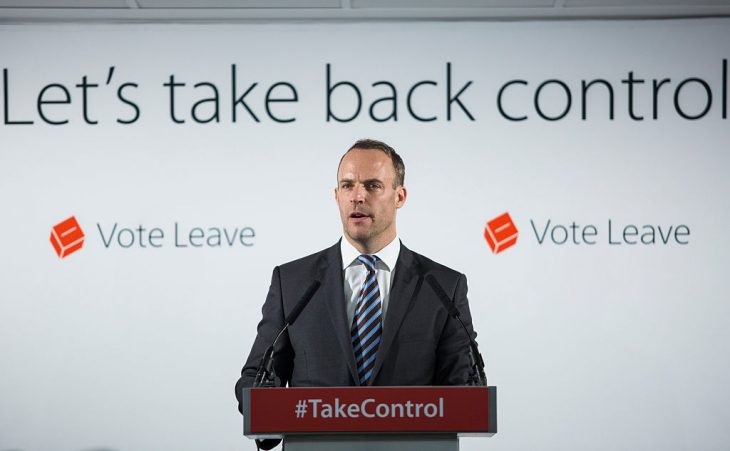The decision by Conservative MPs to walk away from the Commons Committee on Exiting the EU is one of the most unintentionally revealing abdications of duty I have seen. The report they refused to endorse was polite to the point of blandness. The necessity of securing cross-party approval meant that its restrained language bore little relation to the chaos in Whitehall the committee’s hearings had uncovered.
In March, the committee’s chair, Hilary Benn, showed its extent when he submitted David Davis to a tough cross-examination which the Brexit Secretary was lamentably unable to withstand. Although ministers were parroting the line that ‘no deal was better than a bad deal’, Benn got Davis to admit that the government had done no assessment of the costs of crashing out of the EU without a deal. If a business were contemplating a reckless course without at least making a token assessment of the consequences, the shareholders would want a new board. In public, they would accuse managers of recklessness. In private, they would wonder about their sanity.
All the faltering Davis could do was agree that farmers and car manufacturers would face heavy tariffs, while having no estimate of the likely burden on the wider economy.
‘I can’t quantify it for you in detail yet. I may well be able to do so in a year’s time. It’s not as frightening as…some people think, but it’s not as simple as some people think.’
Needless to say, the Brexit Secretary had not one jot of evidence to substantiate his assertion, although he conceded that British people travelling to the EU would probably no longer have healthcare benefits, the financial sector would lose passporting rights and there would be a departure from the EU-US Open Skies arrangement.
After this performance, the committee’s report is a study in understatement. It does not echo the excellent rejoinder of the Labour Pat McFadden, who told Davis his government had ‘mortgaged the country’s economic future to a soundbite’. Rather in neutral language, the report states the obvious when it says:
It is imperative that the Government undertake an economic assessment of the scenario whereby the UK leaves the EU without a deal. The Government must also set out what contingency planning is taking place across Whitehall and the mitigation being considered for a ‘no deal’ outcome.
What responsible politician could object to Britain preparing for the worst? Six Conservative MPs on the committee it turns out, for they refused to endorse the report. Dominic Raab declared that the report was ‘rushed, skewed and partisan’, without, for this is becoming a Tory trait, providing a jot of evidence to justify his insults.
What gives here? Why cannot Tory MPs scrutinise a momentous and complicated project? They are meant to be from ‘the party of business’ but they run away from asking questions about how Brexit will affect the future of financial services, farming and the digital industries. They boast that they are hard-headed realists but, like the alleged snowflakes of the millennial generation, they put their fingers in their ears and shout down facts they find politically incorrect. The report was not pro- or anti-Brexit. The question of whether leaving was the right decision did not arise. As MPs, they had a duty to scrutinise the executive. As Conservatives committed to leaving, they had a responsibility to ensure Brexit was a success.
The brief answer is that all we are seeing is an attempt to dilute the impact of the release of a critical report. On this reading, when they walked out, Raab and his colleagues were merely engaged in a standard propaganda tactic to divert attention and prevent uncomfortable headlines.
But Labour MPs on the committee are convinced that there is a deeper motivation. As I have said before, one of the most attractive features of conservatism appeared to be its insistence on personal responsibility. But on closer inspection it turns out that, although personal responsibility is essential for benefit seekers, Conservative politicians are free to dispense with it at will. From 2010 to 2016, Conservatives could claim that Labour was responsible for their actions. If the government had to slash public services, that was because Labour overspent in the good years. So great was the shock of the 2008 crash, I do not doubt we would have continued hearing that ‘Labour failed to fix the roof when the sun was shining’ well into the 2020s. But Brexit has supplanted the crash. Everything from now on will flow from the decision to leave. Fairly or not, job losses, inflation and the tax take will be explained by the leave victory in June 2016.
Brexit means that the right now has what it demands of others – responsibility. Every day you can see Conservatives trying to avoid it. You need only look at the Conservative press to see how frightened it is that its readers may one day hold it to account. It matches the politicians who stamp out of Commons committee meetings with abuse of Brexit’s critics as ‘enemies of the people’ and ‘remoaners’.
Diversionary tactics far deeper than news management are at work here. The leave campaign’s leaders had no plan for what Britain should do next, in part because they were divided among themselves, in part because any serious examination of the difficulties of leaving the EU would raise the question whether it was worth leaving in the first place. In any case, they did not expect to win, so questions about Britain’s future appeared irrelevant. But they did win. Responsibility is theirs. And, my God, how they hate it.







Comments